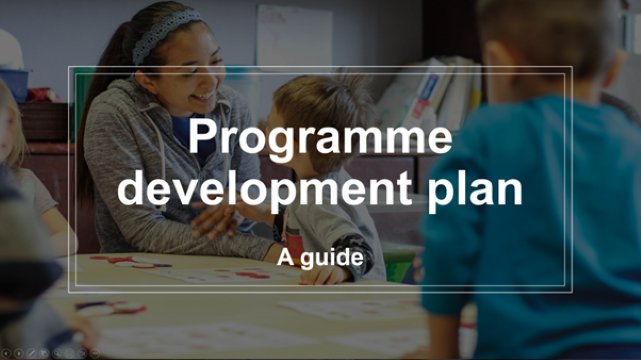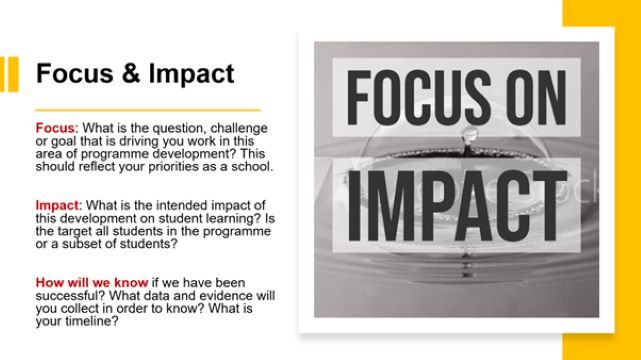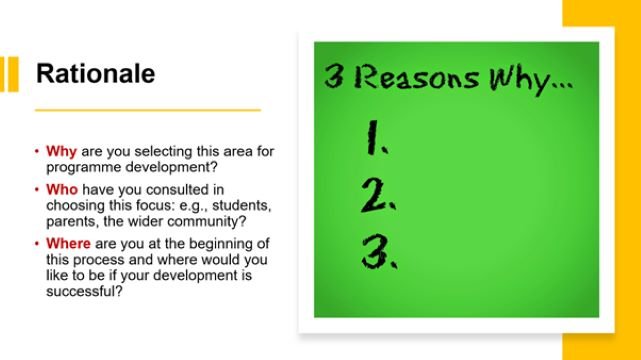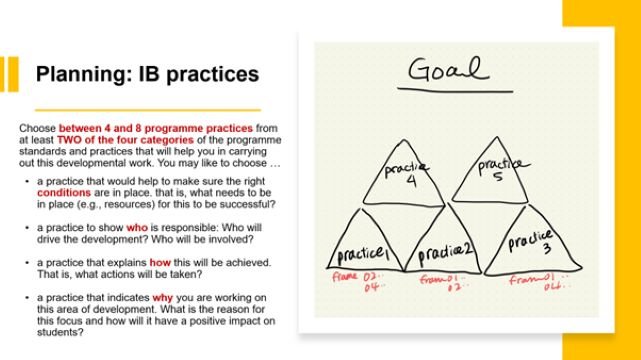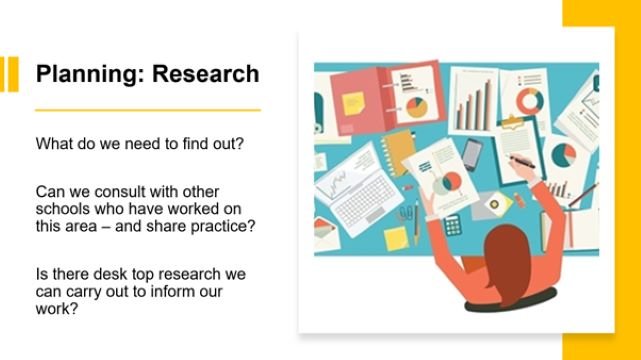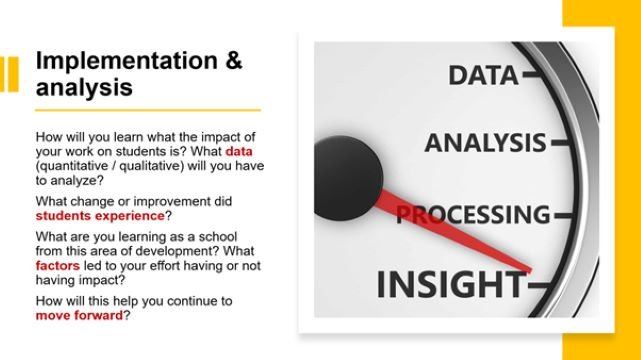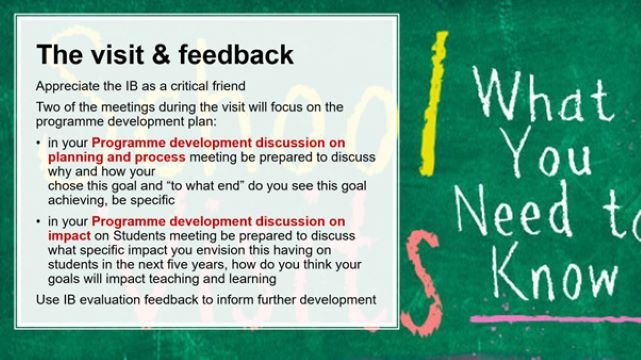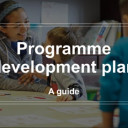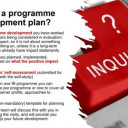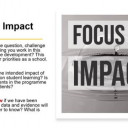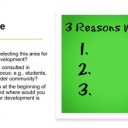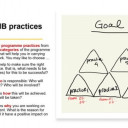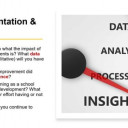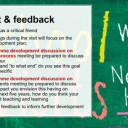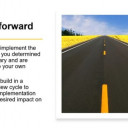Writing a Programme Development Plan (PDP)
.png) How to write a programme development plan (PDP)
How to write a programme development plan (PDP)
This page provides guidance on how to write a programme development plan.
What are you working on? All schools are working on improving aspects of their programme(s). For some this might be developing approaches to learning, for others it might be collaborative planning and working with staff. All schools have identified aspects of programme delivery that they are working on in any given year. This is the context for the (new) programme development plan which is being introduced as part of the new evaluation schedule.
When you prepare for your five year IB evaluation you are asked to document an area of programme development (what you are working on) during the five years since your authorization or last evaluation. This professional inquiry lies at the heart of your self-study. This page will provide you with:
- An introduction to what the IB evaluation requires
- A guide to programme development planning for use with staff and other stakeholders
All schools are aware of the need to continually inquire how they are meeting the needs of students within a context in which the world is changing fast. This is the focus of professional inquiry as you approach your IB evaluation.
“We know that education systems designed in the last century no longer meet the needs of our learners or our societies. We know that schools must be transformed to engage today’s young people. We need a sea change in learning settings for young people. The trickier questions involve knowing what this transformation will look like and how we can achieve it.
The call for disruptive innovation of education systems – where schools, as we have known them, cease to exist – has a certain appeal for those frustrated with the seemingly snail’s pace of system change (Christensen, Johnson, and Horn, 2008). Others urge schools to focus intensely and consistently on improving the quality of teaching and learning with a few strong and carefully constructed goals.” (A framework for transforming learning in schools: Innovation and the spiral of inquiry, Helen Timperley, Linda Kaser and Judy Halbert, Centre for strategic education, April 2014)
Creating dynamic programme development plans
Programme development is the intentional and focused development of a school’s IB programme(s). Schools are always working to develop and improve their programmes and devoting time and resources to make their IB programmes more effective. Programme development planning aims to support schools in their efforts to be more effective for their students and communities.
Read this blog from the IB Community to help you plan your own programme development plan.
Click HERE.
Frequently asked questions
Should the programme development plan selected for submission during programme evaluation be completed or one the school is currently working on? To receive meaningful feedback, the programme development plan should be in an area where the school has completed a substantial amount of work or completed the work entirely. The learning and reflection embedded in the development plan is more effective when schools have completed a cycle of learning.
What feedback will the IB provide on the programme development plan? Feedback is provided on strengths evidenced in planning, implementation, analysis, reflection and learning as well as areas for the school to consider for future or further consideration. Feedback is intended to support the school’s development as a learning community. 2020
Programme evaluation frequently asked questions (FAQs) (IB April 2020)
I have written this guide for you to share with all key stakeholders who will be involved in programme development planning. It explains what it is, where it fits into the evaluation process, and what to expect on an evaluation visit.
 Here I have collected together top tips from schools across the IB World - these are offered as suggestions for you to consider.
Here I have collected together top tips from schools across the IB World - these are offered as suggestions for you to consider.
- Create a common understanding of key terms: in order to create consistency across the school spend time at the beginning collaboratively agreeing on what the key terms mean. For example, in a school which wanted to focus on differentiation they spent time agreeing on what they meant by the term (is it about academic acceleration - going deeper; or about pyschological wellbeing etc.?)
- Be clear from the start what 'success' in the development work will look like. As one school suggested, who chose differentiation as their focus, 'have a product' - in their case it was the production of a handbook on differentiation whch collected together practice across the school.
- Carry out research: connect with other schools before you start your development work - there is a lot of expertise in other IB schools that we can learn from. Other schools attend workshops on the area of focus, do microcredentials on the subject, use social media to reach out to discover good practice.
- Always focus on the impact on student learning: how will student learning be enhanced as a result of your developmental focus? You can have qualitative or quantitative measures.
- Set clear milestones: have clear dates, including when you are going to feed back how you are doing with the wider school community. Don't make the development too open ending, even though some areas for development will always be ongoing (e.g. student well-being, student-centered teaching and learning practices.)
The IB provide an online 'motif builder' to support your design of the programme development plan. Click HERE.
Here are some subjects which schools have chosen. I am selecting the subject and showing how this will have an impact on student learning.
Goal: Design a fully aligned curriculum both horizontally and vertically using State Standards.
Impact: Students in the MYP will have clear learning standards that go alongside their assessment criteria. This provides students with a way to know what they should know and how they will show they know it.
Goal: To design and implement a differentiated teaching and learning framework that will accommodate diverse learning styles, abilities, and interests of students across the 5 years of the MYP, establishing professional development for our teachers so they can create inclusive and differentiated learning environments.
Impact: Designing and implementing a differentiated teaching and learning framework will make a significant difference for our students and their families, as well as our teachers.
- A more tailored teaching to the students' needs will most likely increase engagement.
- Students will receive instruction that cater their individual learning style and preferences, fostering a more inclusive and supportive environment.
- Students will feel supported and challenged at an appropriate level, this will promote confidence and motivation. This positive experience will lead to a nice and conducive learning environment, a happier place for both students and teachers.
- Teachers will be provided with knowledge, resources and strategies to be able to provide students with additional support or challenges when needed.
- By acknowledging and accommodating diverse needs, the school will ensure that every student accesses an education that suits them.
Goal: To rethink our current assessment plan in order to make sure that our assessments are well distributed across the school year. This is to ensure they are effective in helping us, students and families understand the students’ progress and needs for support, while taking care of their wellbeing and avoiding periods of excessive testing.
Impact: Rethinking and planning the assessment calendar better will help students have a better balance between school life and personal life, allowing them for better planning and structure as well as for better preparation for their assessments..
- Teachers will be able to rethink their assessments and make sure they are extremely meaningful. It will also alleviate some of their marking time.
- Students will be able to better focus on each assessment, and to have a better study plan.
- Both students and teachers will be able to prioritize / balance their wellbeing, while still complying with the IB demands and ensuring a fair and effective evaluation of the learning.

 Planning
Planning Analysing
Analysing Reflection
Reflection